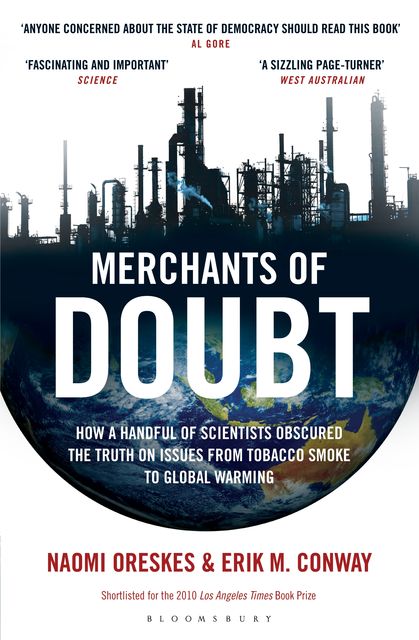Merchants of Doubt
Buku ini saat ini tidak tersedia
569 halaman cetak
- Tahun publikasi
- 2011
- Penerbit
- Bloomsbury Publishing
Kesan
- Anna Sandbergmembagikan kesan4 tahun yang lalu👍Layak dibaca💡Banyak pelajaran
- charu30244membagikan kesan9 tahun yang lalu💞Romantis
Kutipan
- Alberto Galvanmembuat kutipan4 tahun yang laluThe game here, as before, was to defend an extreme free market ideology. But in this case, they didn’t just deny the facts of science. They denied the facts of history.
- Alberto Galvanmembuat kutipan4 tahun yang laluAnd what about cancer? A few years ago, medical researchers realized that there was a shocking flaw in previous studies that investigated DDT exposure and breast cancer. Most of them were done after DDT use was already on the decline, or even after the ban, so the women being studied had probably been exposed only to low levels (if at all), and exposed later in life when the body is less vulnerable. To really know whether or not DDT had an effect, you’d need to study women who’d been exposed to DDT early in life, at a time when environmental exposures were high.
In a remarkable piece of medical detective work, Dr. Barbara A. Cohn and her colleagues identified women who had been part of medical study of pregnant women in the 1960s, and therefore might have been exposed as children or teenagers when DDT use was widespread in the 1940s and ’50s. These women had given blood samples at the time, samples that could now be reanalyzed for DDT and its metabolites. In 2000–2001, they measured DDT-related compounds in these samples and compared them with breast cancer rates. The average age at the time of the original study was twenty-six; these women were now in their fifties and sixties—an age by which breast cancer might reasonably be expected to appear. The results showed a fivefold increase in breast cancer risk among women with high levels of serum DDT or its metabolites.59 DDT does cause cancer, it does affect human health, and it does cost human lives. Rachel Carson was not wrong. - Alberto Galvanmembuat kutipan4 tahun yang laluIf DDT’s defenders have exaggerated its benefits, have its detractors exaggerated the harms? If DDT rarely harms people and sometimes helps, why not reintroduce it? Isn’t Bjørn Lomborg right at least that DDT saved more lives than it cost?
The argument is a red herring. DDT was not banned on the basis of harm to humans; it was banned on the basis of harms to the environment.
fb2epub
Seret dan letakkan file Anda
(maksimal 5 sekaligus)


